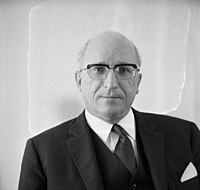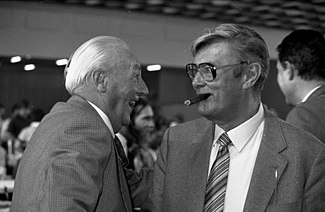1962 North Rhine-Westphalia state election
This article needs additional citations for verification. (January 2024) |
| |||||||||||||||||||||||||||||||||||||||||
All 200 seats in the Landtag of North Rhine-Westphalia 101 seats needed for a majority | |||||||||||||||||||||||||||||||||||||||||
|---|---|---|---|---|---|---|---|---|---|---|---|---|---|---|---|---|---|---|---|---|---|---|---|---|---|---|---|---|---|---|---|---|---|---|---|---|---|---|---|---|---|
| Turnout | 8,188,988 (73.4% | ||||||||||||||||||||||||||||||||||||||||
| |||||||||||||||||||||||||||||||||||||||||
 Results for the single-member constituencies. | |||||||||||||||||||||||||||||||||||||||||
| |||||||||||||||||||||||||||||||||||||||||
The 1962 North Rhine-Westphalia state election was held on 8 July 1962 to elect the 5th Landtag of North Rhine-Westphalia. The outgoing government was a majority of the Christian Democratic Union (CDU) led by Minister-President Franz Meyers.
The CDU lost its majority with a decline of four percentage points to 46%, but remained the largest party by a small margin. The opposition Social Democratic Party (SPD) saw a corresponding gain of four points and won 43%. The Free Democratic Party (FDP) remained steady on 7%. The CDU subsequently formed a coalition with the FDP, and Franz Meyers continued as Minister-President.
Electoral system
[edit]The Landtag was elected via mixed-member proportional representation and had a term of four years. 150 members were elected in single-member constituencies via first-past-the-post voting, and fifty then allocated using compensatory proportional representation. A single ballot was used for both. An electoral threshold of 5% of valid votes is applied to the Landtag; parties that fall below this threshold are ineligible to receive seats. Overhang seats were not compensated.
Background
[edit]In the previous election held on 6 July 1958, the CDU won a landslide victory and took an absolute majority of both votes and seats. The SPD also achieved a swing in its favour, while the FDP and other minors parties suffered losses. The outgoing SPD-led coalition lost its majority and was replaced by a majority government of the CDU led by Franz Meyers.
Parties
[edit]| Name | Ideology | Lead candidate |
1958 result | |||
|---|---|---|---|---|---|---|
| Votes (%) | Seats | |||||
| CDU | Christian Democratic Union of Germany Christlich Demokratische Union Deutschlands |
Christian democracy | Franz Meyers | 50.5% | 104 / 200
| |
| SPD | Social Democratic Party of Germany Sozialdemokratische Partei Deutschlands |
Social democracy | Heinz Kühn | 39.2% | 81 / 200
| |
| FDP | Free Democratic Party Freie Demokratische Partei |
Classical liberalism | Willi Weyer | 7.1% | 15 / 200
| |
Results
[edit]| Party | Votes | % | +/– | Seats | |||||
|---|---|---|---|---|---|---|---|---|---|
| Con. | List | Total | +/– | ||||||
| Christian Democratic Union (CDU) | 3,752,116 | 46.42 | –4.05 | 76 | 20 | 96 | –8 | ||
| Social Democratic Party (SPD) | 3,497,179 | 43.27 | +4.07 | 74 | 16 | 90 | +9 | ||
| Free Democratic Party (FDP) | 553,426 | 6.85 | –0.27 | 0 | 14 | 14 | –1 | ||
| German Peace Union (DFU) | 164,333 | 2.03 | New | 0 | 0 | 0 | New | ||
| Centre Party (ZENTRUM) | 75,291 | 0.93 | –0.12 | 0 | 0 | 0 | ±0 | ||
| All-German Party (GDP) | 34,526 | 0.43 | New | 0 | 0 | 0 | New | ||
| German Community (DG) | 4,917 | 0.06 | +0.06 | 0 | 0 | 0 | ±0 | ||
| Independent Workers' Party (UAP) | 426 | 0.01 | New | 0 | 0 | 0 | New | ||
| Independents | 353 | 0.00 | ±0.00 | – | 0 | 0 | ±0 | ||
| Total | 8,082,567 | 100.00 | – | 150 | 50 | 200 | ±0 | ||
| Valid votes | 8,082,567 | 98.70 | |||||||
| Invalid/blank votes | 106,421 | 1.30 | |||||||
| Total votes | 8,188,988 | 100.00 | |||||||
| Registered voters/turnout | 11,156,285 | 73.40 | |||||||
| Source: [1] [2] | |||||||||
External links
[edit]- "Electoral system of North Rhine-Westphalia". Wahlrecht.de (in German). 15 May 2022. Retrieved 11 March 2023.



